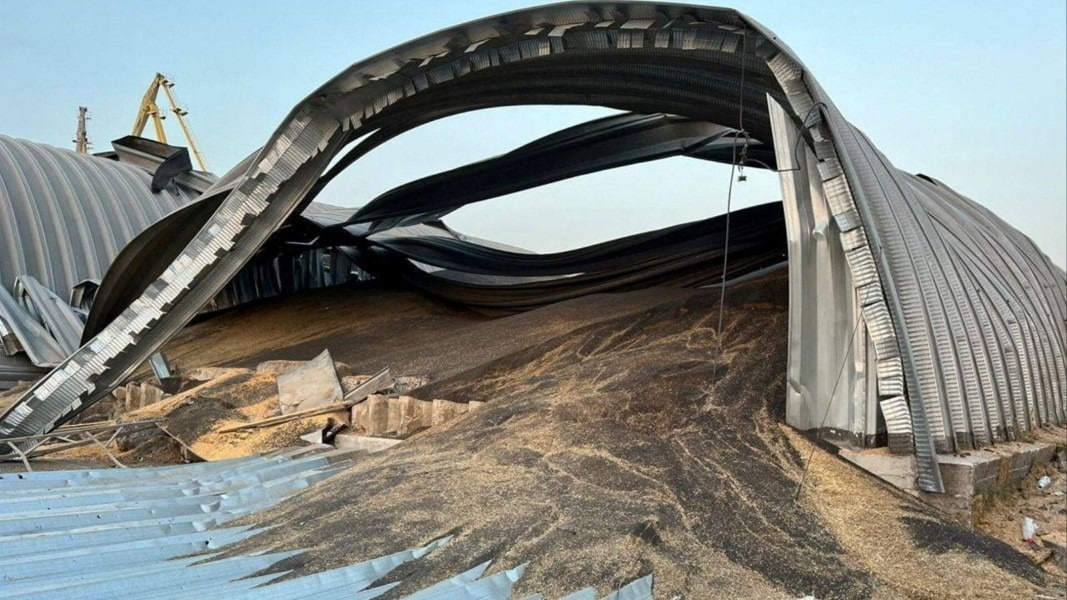Strikes along the Danube, which marks Nato’s border, concern security chiefs
Russian drones targeting Ukrainian grain silos have repeatedly flown along the Romanian border over the Danube river in recent weeks, raising security concerns in the Nato member state as Kyiv claimed at least one drone had crashed there.
Iulian, a Romanian shepherd who grazes his flock on the bank of the Danube, said he had seen drones fly along the river and strike Ukraine, one of the few instances in which Romanians have witnessed scenes of war since Russia’s full-scale invasion of Ukraine 18 months ago.
“They came up along the river, I saw them hit right there,” he said — but added he was unfazed by the flames and smoke.
The Danube, Europe’s second-longest river, is a few hundred metres wide just before it reaches the Black Sea. That is all the distance that separates a hit on Ukraine from a hit on the entire Nato alliance, given its mutual defence clause.
Romania has sought to avoid an open escalation of the conflict, and denied on Monday Kyiv’s claim that a drone had crashed there amid Russia’s increasingly brazen attacks. But Ukraine’s foreign ministry said it was the latest sign that Moscow threatened “the security of neighbouring countries, including Nato member states”.
Upstream, increased traffic at a string of river ports including Izmail has transformed these quiet backwaters into a region of geostrategic importance. Russia has increased its attacks on the area in an attempt to deny Kyiv shipping alternatives via the Danube after Moscow withdrew from an agreement on grain transit from its Black Sea ports — the main route for Ukrainian exports to reach world markets.
Russian warships have since fired warning shots towards at least one commercial vessel approaching Ukraine’s Black Sea ports. Moscow said it considered those cargo ships legitimate targets, though President Vladimir Putin on Monday said he was “open to negotiations” about returning to the UN-brokered grain transport deal.

At the Romanian Black Sea port of Constanța, shipping companies safely handle grain arriving from Ukraine via the Danube and linked canals but also on trucks and trains, transferring the goods on to ships headed towards the Bosphorus strait and the Mediterranean Sea.
But the recent explosion of a suspected Russian sea mine, which washed up on a beach near Constanța, highlights the continued perils stemming from the area’s proximity to the war zone.
“We are very concerned,” Romanian defence minister Angel Tîlvăr told the Financial Times. “Russia continues to create new risks for miscalculation and escalation.”
Romania had deployed 11 warships, two helicopters, six maritime search drones and three detachments of explosive-specialist divers off its coast, he said. Nato surveillance planes now permanently patrol the Romanian frontier.
“We are prepared for any contingency situations,” he said. Tîlvăr denied reports of Russian drones or Ukrainian shells accidentally hitting Romanian soil but added that “no country that borders Ukraine could exclude entirely the possibility [of getting] hit by mistake”.

One of the few countries to consistently meet Nato’s annual spending goal of 2 per cent of gross domestic product, Romania increased its defence budget to about $7.5bn or 2.5 per cent of GDP this year in response to the war.
The country is set to open an F-16 training centre for Ukrainian pilots while also buying more US-made jets, tanks, howitzers and drones for its own armed forces, Tîlvăr said.
Such spending would have seemed excessive in the past, but not after Russia brought the conflict zone so close to Romania’s borders, said Sandu-Valentin Mateiu, a retired naval and intelligence officer focusing on Russia.
“We are on the front line,” he said. While Romania has no land border with Russia, “our exclusive economic zone touches with Crimea’s out at sea”. Russia annexed Crimea in 2014 and used it as a launching pad for last year’s invasion with missile and drone attacks on Ukrainian cities continuing from the area.

Mateiu said Russia was deliberately testing legal grey areas in international maritime agreements as it tries to destroy Ukraine’s grain export channels.
“They push hard with this tricky game,” he said. “They will stop short of war [with Nato].”
Mateiu also noted that while Kyiv might be in favour of greater Nato involvement in the conflict, Bucharest was cautious. “As far as the Russians do not pose a real threat to human life or property on our territory, including our territorial waters, Bucharest will not look for escalation, even diplomatically.”
He added: “As soon as a real threat affects us, Bucharest will act rapidly for a harsh diplomatic answer.”
Prime Minister Marcel Ciolacu, a social democrat who took office in May, has pledged unconditional support for Ukraine and committed to doubling the volume of grain transiting Romania from Ukraine, mostly via Constanța.
But Romania’s crop is likely to exceed last year’s and other exporters that use the Constanța port, such as Hungary and Serbia, may also produce bumper crops, raising doubts about the feasibility of that pledge.
Viorel Panait, who owns Comvex, Constanța’s largest grain terminal operator, said the entire logistics network needed to be renewed.
“In July, [the city] handled close to 70 per cent of the total amount of grain delivered from Ukraine. That required us to be inventive,” he said. He spent €4mn on doubling the company’s capacity to discharge the grain, and worked with the government on digital customs procedures to reduce waiting times from 36 hours to 30 minutes, cutting costs.
Recruiting more barge pilots to increase traffic in the Danube delta could help, he said. “The pressure of cargo mounts. Ukrainian neighbours need to export those cargoes. More vessels mean more quantity.”
Ahead of next year’s elections, the Ciolacu government also needed to consider growing resentment from Romanian farmers who struggle to compete with cheaper Ukrainian grain, and voter fatigue with the war, said Costin Ciobanu, a researcher at the University of London.
“Farmers are an important constituency for Ciolacu,” he said. Romania was one of a group of eastern EU countries that imposed a grain import ban from Ukraine, even while it facilitated the transit of millions of tonnes of foodstuffs.
Ahead of local, parliamentary, presidential and EU elections in 2024, Romania’s nationalist AUR party was making steady gains promoting an anti-Ukraine message, Ciobanu said.
While a majority of Romanians are sceptical that Russia will strike their country, a recent poll showed that more than half of respondents blamed the war for issues such as rising food and fuel prices.
On Costinești beach, 30km south of Constanța, fisherman and restaurateur Matei Datcu said he was less afraid of sea mines washing up on the shore than he was about the worsening economy.
“A mine is large, you can see it and go round it,” Datcu said. “Next year, the taxes are going to rise. That [feels] more real than any mine that accidentally reaches the beach.”
Source: Financial Times



